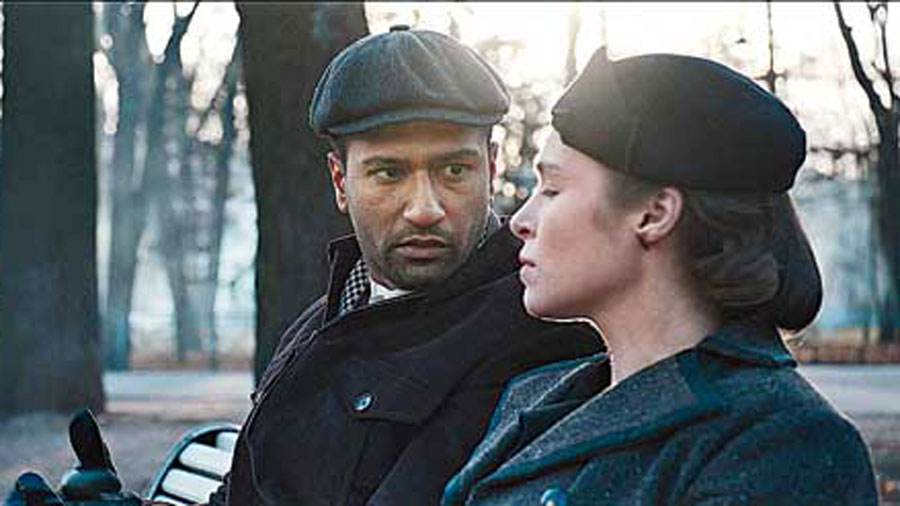Film: Sardar Udham
Director: Shoojit Sircar
Cast: Vicky Kaushal, Amol Parashar, Shaun Scott, Stephen Hogan, Banita Sandhu, Kirsty Averton
Running time: 163 minutes
The screams come late in Sardar Udham. And they are horrific. In what is perhaps the most traumatising last hour ever witnessed in Hindi mainstream cinema, director Shoojit Sircar brings alive the starkness of the Jallianwala Bagh massacre of 1919. A peaceful protest turned horrifyingly bloody where the bullets of the British spare none. Men, women, children fall in a heap, limbs shorn off, a bullet finding a forehead, yet another piercing a stomach. Screams, many aborted as they fall prey, rend the air, as the bodies keep piling up. The shooting continues mercilessly till the ground turns into a graveyard. Later that evening, a young man of barely 20, feverishly push-carts a handful of barely-alive survivors to a makeshift hospital. He trips over bodies, he trudges through pools of still-fresh blood, he grimaces every time he spies a familiar face. But he doesn’t give up.
For the next 21 years, Udham Singh doesn’t give up. The screams stay within him, but he operates with almost mechanical silence. Sircar makes his protagonist, a man shrouded in mystery in the annals of history, a shadowy figure imperceptibly going about his mission to avenge the massacre in a measured fashion.
Over the next two decades since the Jallianwala horror, Udham Singh — played with a remarkable mix of restraint and full-bloodedness by Vicky Kaushal — shows up in the most unexpected places. Two years after stumbling out of a Punjab jail, he trudges through snow-clad Russia, in images reminiscent of Leonardo DiCaprio’s Hugh Glass in The Revenant. A few years later, in a scene that will instantly remind you of The Godfather, Udham alights at a London dockyard with the single-minded determination to bring to fruition what has been searing within him for years. Yet, he waits six years before storming into Caxton Hall and pumping bullets into Michael O’Dwyer, whose tacit instructions to Reginald Dyer on the ground in Punjab, resulted in the bloodbath that, as the film points out at the end, the British government still hasn’t apologised for.
Shoojit Sircar, even when he operates within genre tropes, is always known to throw a curveball at the viewer. Sardar Udham is no different. For an audience habituated to the chest-thumping jingoism that the word ‘revolutionary’ invariably accompanies Bollywood films of this genre, the first 20 minutes of Sardar Udham work in almost complete silence. But then, it will be too simplistic to box this film into a genre, least of all a biopic. Sardar Udham is a slow-burn watch that, in a consistently non-linear fashion, traces the evolution of a revolutionary. This is a film that shows, quietly but very effectively, that one doesn’t need to uproot a handpump or launch into a frenzied battle cry laced with josh and jingoism to pledge allegiance to country and countrymen.
Instead, what we have is a genuine effort to highlight our heroes beyond the limits of a hurriedly put-together school textbook and to show the Jallianwala Bagh incident for what it is — a horrific mass murder that has increasingly been relegated to a footnote in history. In Udham Singh, we find a man in a foreign country who is constantly marshalling forces and resources to carry out his mission. Sher Singh, Ude Singh, Frank Brazil, Ram Mohammed Singh Azad... he takes on many names and identities, with Shoojit, aided by Avik Mukhopadhyay’s powerful lensing, shadowing Udham, but never confronting or overpowering him.
In fact, except for the massacre at the end, there is nothing that screams out in Sardar Udham. The anger is seething, the helplessness even more so. Ritesh Shah and Shubhendu Bhattacharya’s almost staccato screenplay constantly jumps between events and timelines, but there is little in Sardar Udham that jars. This, however, is not a film where something constantly ‘happens’ on screen. And it’s in these moments of semi-languidness that Shoojit’s strong hold over his craft and his talent for emotional storytelling is most evident.
Sardar Udham’s biggest triumph also lies in the fact that it uses the past to mirror the present. The true meaning of law and justice is debated in one scene as are the implications of ruling by instilling fear. After killing O’Dwyer, when Udham is repeatedly asked his name and mercilessly tortured for his silence, he thrusts out his arm on which is tattooed ‘Ram Mohammad Singh Azad’, making a fair cause for the secularity this country was once known for and is increasingly in danger of losing.
With Sardar Udham being a film that’s equal parts in Hindi and English, a bunch of Indian and foreign actors comprise the cast, most of whom fit their parts perfectly. The youthful vigour of Bhagat Singh is brought alive by Amol Parashar in a cameo, while Banita Sandhu — also seen in Shoojit’s October — ably fills in a part that defines Udham’s youth.
From the carefree youngster to the steely man on a mission, it’s Vicky Kaushal, shouldering the film, who has the responsibility of living and breathing every life stage of Udham Singh. Vicky has rather large shoes to fill with Shoojit always wanting to make Sardar Udham with the late Irrfan in the lead. The young actor starts off slow, but quickly comes into his own, delivering an act punctuated by silences and gestures that speak more than his words.
But his words are just as effective. “Koi zinda hain?”, Udham screams helplessly and angrily, as he holds up a lantern and stumbles through the bodies at Jallianwala Bagh. That’s a cry that will stay with me for a while. A cry that rings true even now. Are we really alive?
